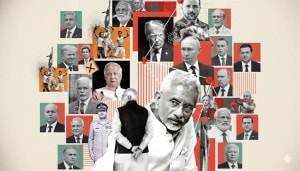Empty coffers, falling profits
Telco, one of the leading vehicle manufacturers in the country and a favourite of punters till last year, has been topping the list of to...

Telco, one of the leading vehicle manufacturers in the country and a favourite of punters till last year, has been topping the list of top losers on the stock markets for quite some time. The scrip of this leading company in the Tata group is now quoting at the five-year low level of around Rs 100.
This is not without reasons. Production of medium and commercial vehicles showed a decline of 53 per cent and sales were down by 37 per cent during the five-month period ended August. Even as sales plunged by 47 per cent, Telco was forced to cut production of commercial vehicles by 63 per cent in the April-August period. Now speculation is rife in the market that Telco will report losses in the first six-month period for the first time in the last several years.
When Reliance Industries, the largest private sector firm, came out with a 9.6 per cent growth in net profit to Rs 921 crore in the first half of this year, analysts and brokers were not enthused. Reason: the growth in net profit in the previous yearwas much higher at 29 per cent. While Rallis of the Tata group came out with a six per cent fall in net profit, Universal Cables8217; bottomline fell by 52 per cent in the first half. 8220;Except for pharma, software and some consumer goods companies, no other sector is doing well,8221; said an official of Tata Mutual Fund.
Predictably, the initial bunch of first-half results from software companies like Infosys, Satyam and Pentafour turned to be bumper performance from these companies. Corporate pundits are now keenly awaiting results from leading companies like Grasim, Lamp;T, ACC, IPCL, Bajaj Auto, Tata Steel, Hindalco and so on. If the stock market trend is any indication, this year is going to be worse than the last year for most of these companies. The Bombay Stock Exchange Sensex had last week fallen to the 52-week level of 2764 and most of scrips in the prestigious A group of the BSE are quoting at their 52-week low levels.
A study by the Centre for Monitoring Indian Economy CMIE has indicated that 8220;thefirst four months of industrial data show that industry has grown by only four per cent this year against a 5.4 per cent growth in the preceding year.8221; It says the industrial sector would not only suffer a demand constraint to growth but also stagnation in investment activities in 1998-99.
Steel companies like Tata Steel, SAIL, Ispat, Jindal and Essar are finding the going tough. Production of finished and saleable steel declined to 74.42 lakh tonnes in the April-August period from 76.65 lakh tonnes in the same period of last year. Considering the fact that margins are also under tremendous pressure, the balance sheets of some of these companies are likely to be splattered with red ink. Similarly, companies in the cotton textiles which were doing well till 1997-98 received a setback in the current year. The growth of chemical sector has also dipped to 3 per cent from 20 per cent.
Cement is also facing a similar situation with lower production, tapering demand and falling prices still playing havoc withcompanies in the sector. Production in the first five months rose by just 4.5 per cent to 344.90 lakh tonnes. Companies like cement giant ACC are now pinning their hopes on the economic package announced by Prime Minister A B Vajpayee on Saturday. 8220;If ths government spends more in major infrastructure projects, we will see a rise in demand,8221; said an industry spokesman.
Merrill Lynch, a leading foreign investment firm, has revised downwards the earnings growth for Sensex companies 30 leading companies which constitute Sensex from 11.2 per cent from 5.2 per cent following the deterioration in the world economy, consequent reduction in commodity prices, political uncertainty in the country and poor business confidence. Moreover, inflation has been rising gradually and given the state elections in November one could even see the Reserve Bank of India tightening liquidity to curb inflation.
While Merrill Lynch says India is in a relatively comfortable position when compared to others in Asia, lack ofprogress in economic reforms, nuclear tests and subsequent sanctions, downgrading by rating agencies and a budget perceived as being too protectionist has led to negative sentiment among investors. With primary and stock markets remaining in doldrums, companies are unable to raise resources for expansion and modernisation.
The CMIE has listed three major factors which would be responsible for the slowdown in the industrial sector in 1998-99. First, it said domestic consumer demand is expected to slow down substantially. The delay in monsoon and its erratic bahaviour followed by floods has already damaged kharif crop and this second cosecutive year of a poor crop is expected to seriously affect rural demand for industrial goods. The fall in financial and property markets continues to erode wealth and this is also expected to hurt consumer spending. This is already evident now. The consumer goods industry showed a 0.5 per cent decline and consumer durables 4.7 per cent fall in July 1998.
Secondly,investment spending has also been going down. CMIE8217;s survey of investment projects has indicated a 39 per cent decline in investments on hand. During August-September 1998, projects worth Rs 10,000 crore were shelved. Thirdly, import substitution of domestic demand is on the rise. The share of imports in the total domestic market for industrial goods is on the rise. 8220;And this increasing competition from imports has a direct bearing on the growth of the domestic industrial sector,8221; it says.
In fact, most of the leading companies had witnessed a fall in profits in the first quarter ended June 1998. The second quarter July-September promises to be worse than the first quarter. Indicating the all-round slowdown, debt instruments of nearly 70 corporates have been downgraded by rating agencies in October so far against an usual average figure of 30 per month. These downgrades not only indicated the weakening repayment ability of the companies concerned but also their ability to withstand the prevailingeconomic pressures.
Will the measures like buy-back of shares and government spending on infrastructure announced by Vajpayee on Saturday reverse the trend? As former BSE president M G Damani put it, 8220;though I wish it had only come earlier. The mood of the market is so bearish that the announcement would fail to bring in the needed impact.8221; Certainly the markets and industry need more such measures to come out of the path leading to recession.
- 01
- 02
- 03
- 04
- 05































